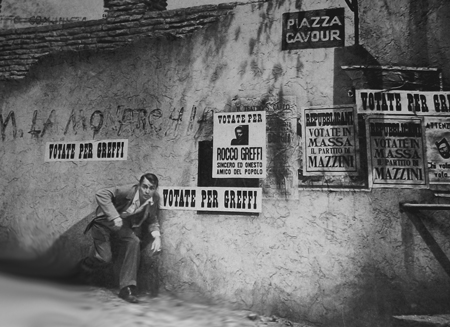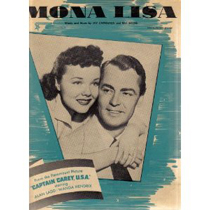
 |
|
|
|
The talented Richard Maibaum earned his greatest fame adapting more than a dozen of Ian Fleming's James Bond adventures to the screen. But more than a decade earlier Maibaum wrote and/or produced several thrillers at Paramount for actor Alan Ladd, including an interesting, noir- inflected adaptation of The Great Gatsby. 
Two of the Ladd-Maibaum films prefigure the later 007 outings. 1946's O.S.S. is a sober espionage adventure about an American agent operating in Nazi-held France. The wartime Office of Strategic Services was the precursor to our modern C.I.A. Four years later the team returned to espionage escapism with the patriotic-sounding Captain Carey, U.S.A. (UK title: After Midnight). The surprisingly complex tale concerns an O.S.S. agent who returns to Italy after the war on a mission of vengeance. By 1950 the primary threat in spy thrillers had already shifted from enemy Nazis to a new set of Cold War foes. American movies stopped reminding audiences that unpunished war criminals were still at large. The RKO picture Cornered was rewritten to tone down the claim that Nazi cadres were active in South America. This postwar thriller largely restricts its politics to a personal betrayal. O.S.S. Captain Web Carey (Ladd) and his radioman Frank (Paul Lees) are forwarding secret information to the U.S. Army from a picturesque palace on an island in German-held Northern Italy. Helping them is Web's lover Giulia de Cresci (Wanda Hendrix), whose family owns the island. But someone betrays the team and Web is the only survivor of a Nazi raid. Three years later Web is still trying to forget. At a Manhattan art dealer he discovers that someone - possibly the unknown informer -- is selling art treasures from a hidden room in the palazzo that only he and Giulia knew about. Carey returns to Italy determined to track down and kill the informer, and is troubled to find that the locals blame him for a Nazi massacre of 28 villagers. But he then receives an even bigger shock: Giulia is still alive and married to the aristocratic Barone Graffi (Francis Lederer). Thoroughly disillusioned, Captain Carey is about to leave when a murder occurs in his hotel. The peculiar attitudes of Giulia's mother Countess de Cresci (Celia Lovsky) and Doctor Lunati (Joseph Calleia) convince the ex-espionage agent that there's more to the mystery than meets the eye. 
Who informed on the O.S.S. team that night, and caused the death of 28 villagers? Alan Ladd's star appeal is undiminished in this mystery thriller set in a beautiful locale, with more than its share of intrigue and personal jeopardy. The actual mystery is the weak link: when events suggest that Wanda Hendrix's Giulia was the informer, we remain unconvinced. Ladd and Hendrix make a handsome couple, even if Ladd's impassive demeanor inhibits their romantic chemistry. Absolutely adorable in her early pictures Confidential Agent and Nora Prentiss, Ms. Hendrix saw her career crumble after a failed marriage to the unstable war hero/actor Audie Murphy. Actor Francis Lederer is a German transplant still most famous for his role opposite Louise Brooks in the silent classic Pandora's Box. His suave Baron Graffi, an ambitious politician, has a good alibi -- he spent the last year of the war in Switzerland. Adding a bit of old-world sadness is the talented Celia Lovsky, whose worn face may be hiding malice, or just the effects of cruel compromise. After helping to promote Peter Lorre to director Fritz Lang in the late 1920s, Lovsky accompanied the actor to America, where they eventually married. Only after their divorce years later did she embark on a busy career as a Hollywood character actress. Writer Robert Theoren is now best remembered for providing the original story idea for Billy Wilder's comedy Some Like it Hot. He received story and writing credits on films by Douglas Sirk (Summer Storm) and Joseph Losey (The Prowler). Testifying to Theoren's screenwriting skill is the fact that Captain Carey's tangle of betrayals and cover-ups does not leave the audience in utter confusion. The strongest stylistic stamp on Captain Carey is that of Mitchell Leisen, a legendary director of glamorous Paramount dramas and comedies. Leisen develops the clue of the mystery painting in a way that would remind the 1950 audience of real Nazi thefts of art from occupied territories. Although director Leisen is sometimes unfairly described as a director of décor, the film delivers an exciting fight scene at the finish. His skill with actors shows in the intelligent, nicely paced confrontations between Carey and Lederer's Count, with the cynical doctor and the secretive Countess looking on. Director Leisen preferred to work in the controlled environment of the studio, on ornate interior sets. Going against the late-'40s vogue for location shooting, Captain Carey uses miniatures, mattes and rear-projection to depict a mountainous district of Northern Italy. The special effect illusions aren't bad and the cinematography by John F. Seitz is always attractive, but audiences in 1950 were becoming accustomed to more naturalistic locations. The supporting actors and bit players also come straight from Hollywood Central Casting. A major subplot involves a bitter widow whose husband was falsely accused as the informer, and murdered by his own neighbors. We're intrigued to see her son played by Rusty (Russ) Tamblyn, but in no way does the athletic child actor pass as Italian. 
Fairly obscure today, Captain Carey, U.S.A. is remembered almost exclusively for its introduction of the pop ballad Mona Lisa, which soon became a #1 radio hit for Nat King Cole. Written by Ray Evans and Jay Livingston, the tune won the Oscar for Best Original Song of 1950, besting Bibbidi-Bobbidi-Boo from Disney's Cinderella. In the film an Italian partisan sings the tune to warn the American agents when a German patrol is near. A nice twist occurs when Web Carey returns three years later. The only 'friendly' local in the village is a blind musician, who plays the old resistance 'warning' signal on his accordion. Olive Films' Blu-ray disc of Captain Carey, U.S.A. presents this finely crafted Mitchell Leisen thriller in a crisp HD transfer. The soundtrack is also quite clean. No extras are included. A standard DVD disc of the film is being released concurrently.
On a scale of Excellent, Good, Fair, and Poor,
Captain Carey, U.S.A. Blu-ray rates:
Reviews on the Savant main site have additional credits information and are often updated and annotated with reader input and graphics. Also, don't forget the 2011 Savant Wish List. T'was Ever Thus.
Review Staff | About DVD Talk | Newsletter Subscribe | Join DVD Talk Forum |
| ||||||||||||||||||